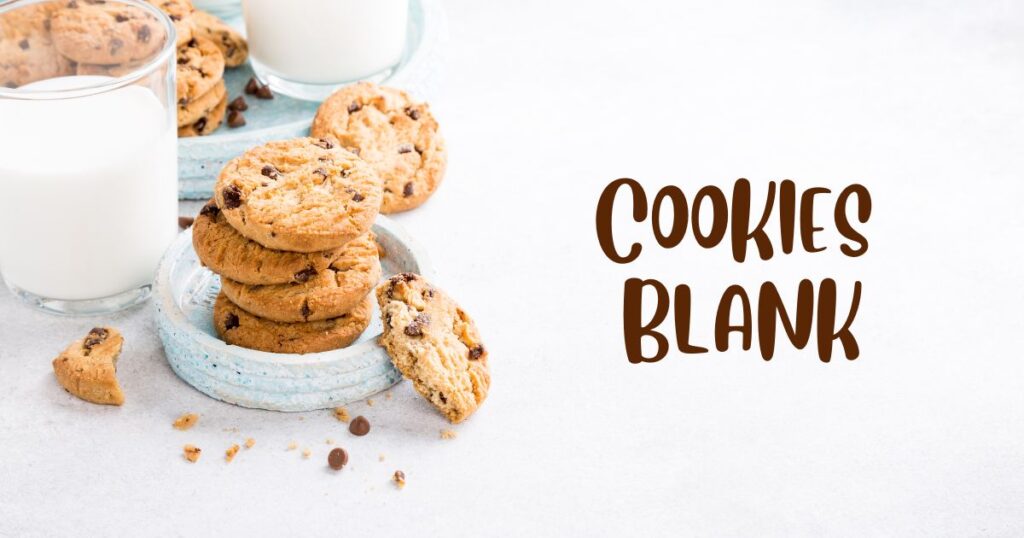cookies blank are more than just a dessert; they hold a special place in our hearts, reminding us of home, celebrations, and sweet moments shared with loved ones. Whether enjoyed fresh out of the oven or purchased from a bakery, cookies offer a delightful combination of flavors and textures. In this article, we’ll explore the fascinating world of cookies, their history, variations, cultural significance, and why they remain a timeless favorite.
The History of Cookies
Cookies have been enjoyed for centuries, originating from simple baked goods. Their name is derived from the Dutch word koekje, meaning “little cake.” These small treats were initially created as test batches to check oven temperatures for cakes. Over time, they evolved into standalone delights.
The earliest cookies were likely made in Persia around the 7th century, where sugar was first cultivated. As trade routes expanded, cookies spread across Europe, becoming particularly popular in England and the Netherlands. By the 17th century, cookies had made their way to America, where they flourished with regional adaptations.
What Makes a Cookie a Cookie?
At its core, a cookie is a small, sweet, baked good made from flour, sugar, and fat, often with additional ingredients like chocolate chips, nuts, or spices. What sets cookies apart from other baked goods is their size, portability, and versatility. They can be soft, chewy, crunchy, or even a combination of textures, catering to diverse tastes.
The Science Behind Baking Cookies
Baking cookies is as much science as it is art. Ingredients like butter, sugar, and eggs interact uniquely when exposed to heat. For instance, sugar caramelizes to give cookies their golden-brown color, while butter melts, creating the soft texture we love. Baking soda or powder provides lift, and flour gives structure. Each ingredient plays a crucial role in the final product.
Popular Cookie Varieties
The sheer variety of cookies ensures there’s something for everyone. Here are some of the most beloved types:
Chocolate Chip Cookies: A classic favorite, invented in 1938 by Ruth Graves Wakefield, featuring a perfect balance of sweet dough and chocolate chips.
Oatmeal Raisin Cookies: A wholesome option combining chewy oats and sweet raisins.
Sugar Cookies: Simple yet versatile, often decorated for holidays.
Snickerdoodles: Known for their cinnamon-sugar coating and soft texture.
Macarons: French almond meringue cookies with a delicate, airy texture.
Gingerbread Cookies: A festive treat, especially during the holidays, with a spicy kick.
Cultural Significance of Cookies
Cookies hold cultural importance around the world. In the United States, cookies are synonymous with comfort and nostalgia, often baked during holidays or as a family activity. In Europe, cookies such as shortbread in Scotland and biscotti in Italy are enjoyed alongside tea or coffee. Meanwhile, Middle Eastern cookies like ma’amoul are filled with dates or nuts and shared during religious celebrations.
The Role of Cookies in Celebrations
Cookies play a starring role in many celebrations. From Christmas sugar cookies shaped like snowflakes to fortune cookies handed out at the end of a Chinese meal, they bring a sense of joy and tradition. Wedding cookie tables, popular in some cultures, showcase a variety of cookies as part of the festivities.
Why Do People Love Cookies So Much?
Cookies appeal to people for several reasons. First, they’re portable and easy to share. Second, the range of flavors means there’s a cookie for every palate. Lastly, they evoke fond memories, from childhood snacks to baking sessions with loved ones.
Tips for Baking Perfect Cookies at Home
Use Quality Ingredients: Fresh butter, high-quality vanilla, and good chocolate make a noticeable difference.
Chill the Dough: Chilling helps control spread and enhances flavor.
Don’t Overmix: Overmixing can lead to tough cookies. Mix just until the ingredients are combined.
Watch the Oven: Every oven is different. Check your cookies a minute or two before the recommended baking time.
Cool Properly: Allow cookies to cool on the baking sheet for a few minutes before transferring them to a wire rack.
Store-Bought vs. Homemade Cookies
Store-bought cookies offer convenience, consistency, and a long shelf life, making them a go-to for busy individuals. However, homemade cookies bring a personal touch, allowing bakers to experiment with ingredients and tailor recipes to their tastes. Both have their merits, but homemade cookies often carry an unmatched emotional value.
Cookies and Modern Trends
The cookie world continues to evolve with modern trends. Gluten-free, vegan, and keto-friendly cookies cater to dietary preferences, while gourmet cookies with unique flavor combinations—such as lavender honey or matcha white chocolate—are gaining popularity.
Cookies in Media and Pop Culture
Cookies have a strong presence in media and pop culture. Who doesn’t recognize the iconic Cookie Monster from Sesame Street or the famous scene from Friends where Phoebe’s grandmother’s cookie recipe turns out to be Nestlé Toll House? These representations further cement cookies as a beloved part of our lives.
The Economics of Cookies
The global cookie market is thriving, driven by consumer demand for indulgence and convenience. According to recent studies, the cookie industry is valued at billions of dollars, with continual growth as new flavors and innovations hit the market.
How to Enjoy Cookies Guilt-Free
Moderation is key when it comes to enjoying cookies. Pairing them with a glass of milk, tea, or coffee can enhance the experience. If you’re concerned about sugar, smaller portions or recipes with alternative sweeteners can provide a satisfying treat without overindulgence.
Conclusion
Cookies are a universal symbol of joy, comfort, and creativity. Whether you’re baking them from scratch, enjoying a store-bought variety, or sharing them during special occasions, cookies have a way of bringing people together. Their enduring popularity is a testament to their ability to adapt, delight, and satisfy generations.
FAQs
What is the most popular cookie in the world?
The chocolate chip cookie remains the most popular worldwide, loved for its perfect mix of sweetness and texture.
Why are cookies called cookies?
The term “cookie” comes from the Dutch word koekje, meaning “little cake.”
How can I make cookies healthier?
Using whole-grain flour, reducing sugar, and adding nutrient-rich ingredients like nuts or dried fruits can make cookies healthier.
Why do cookies spread too much during baking?
Cookies may spread too much if the dough is too warm or if there’s too much butter or sugar in the recipe.
Can I freeze cookie dough for later use?
Yes, most cookie doughs freeze well. Simply portion the dough, freeze it, and bake directly from frozen when ready.







